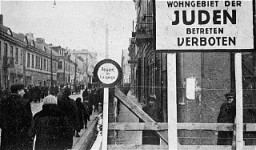You searched for: %20010%20%EC%9D%B8%EC%A6%9D%20%EB%8C%80%ED%96%89%20%20%ED%85%94%EB%A0%88%20GID889%EC%B9%B4%ED%86%A1%20%EC%95%84%EC%9D%B4%EB%94%94%20%ED%8C%90%EB%A7%A4%20%EC%A4%91%EA%B3%A0%EB%82%98%EB%9D%BC%EC%95%84%EC%9D%B4%EB%94%94%EA%B1%B0%EB%9E%98%20%20%EA%B5%AC%EA%B8%80%20%EC%95%84%EC%9D%B4%EB%94%94%20%ED%95%B4%ED%82%B9%20%20%ED%8E%98%EB%B6%81%20%EA%B3%84%EC%A0%95%20%EA%B1%B0%EB%9E%98%20%ED%8E%98%EC%9D%B4%EC%8A%A4%20%EB%B6%81%20%EA%B3%84%EC%A0%95%20%ED%95%B4%ED%82%B9%20%20%EB%B8%94%EB%A1%9C%EA%B7%B8%20%EC%95%84%EC%9D%B4%EB%94%94%20%ED%8C%90%EB%A7%A4%20%ED%8E%98%EB%B6%81%20%EC%95%84%EC%9D%B4%EB%94%94%20%EB%A7%8C%EB%93%A4%EA%B8%B0%20%EC%A4%91%EA%B3%A0%20%EB%82%98%EB%9D%BC%20%EA%B3%84%EC%A0%95%20%ED%8C%90%EB%A7%A4%EC%83%9D%EC%84%B1%EC%95%84%EC%9D%B4%EB%94%94%ED%8C%8C%EB%8A%90%EA%B3%B3%ED%95%B4%ED%82%B9%EC%95%84%EC%9D%B4%EB%94%94%EA%B1%B0%EB%9E%98%E2%9F%B4%E2%A5%A9267702
<< Previous | Displaying results 401-430 of 430 for "%20010%20%EC%9D%B8%EC%A6%9D%20%EB%8C%80%ED%96%89%20%20%ED%85%94%EB%A0%88%20GID889%EC%B9%B4%ED%86%A1%20%EC%95%84%EC%9D%B4%EB%94%94%20%ED%8C%90%EB%A7%A4%20%EC%A4%91%EA%B3%A0%EB%82%98%EB%9D%BC%EC%95%84%EC%9D%B4%EB%94%94%EA%B1%B0%EB%9E%98%20%20%EA%B5%AC%EA%B8%80%20%EC%95%84%EC%9D%B4%EB%94%94%20%ED%95%B4%ED%82%B9%20%20%ED%8E%98%EB%B6%81%20%EA%B3%84%EC%A0%95%20%EA%B1%B0%EB%9E%98%20%ED%8E%98%EC%9D%B4%EC%8A%A4%20%EB%B6%81%20%EA%B3%84%EC%A0%95%20%ED%95%B4%ED%82%B9%20%20%EB%B8%94%EB%A1%9C%EA%B7%B8%20%EC%95%84%EC%9D%B4%EB%94%94%20%ED%8C%90%EB%A7%A4%20%ED%8E%98%EB%B6%81%20%EC%95%84%EC%9D%B4%EB%94%94%20%EB%A7%8C%EB%93%A4%EA%B8%B0%20%EC%A4%91%EA%B3%A0%20%EB%82%98%EB%9D%BC%20%EA%B3%84%EC%A0%95%20%ED%8C%90%EB%A7%A4%EC%83%9D%EC%84%B1%EC%95%84%EC%9D%B4%EB%94%94%ED%8C%8C%EB%8A%90%EA%B3%B3%ED%95%B4%ED%82%B9%EC%95%84%EC%9D%B4%EB%94%94%EA%B1%B0%EB%9E%98%E2%9F%B4%E2%A5%A9267702" | Next >>
-
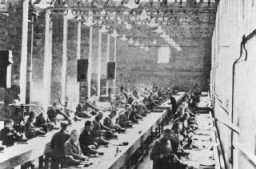
-
The Holocaust in Odesa
ArticleIn October 1941, Romania, an ally of Nazi Germany, perpetrated mass killings of Jews in Odesa. Learn more about the Holocaust in Odesa and Ukraine.
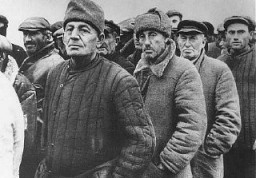
-
Law for the Imposition and Implementation of the Death Penalty
ArticleLearn more about the Law for the Imposition and Implementation of the Death Penalty, which the Nazis enacted after the Reichstag Fire Decree in 1933.
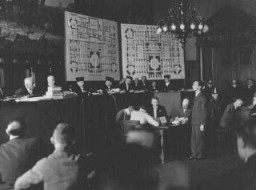
-
Jeno Muhlrad
ID CardJeno was the youngest of five children born to Jewish parents living in a suburb of Budapest. His father was a wholesale merchant who sold beer to restaurants and stores. After receiving a university diploma, Jeno became a pharmacist. He and his wife, Aranka, and their two children, Eva and Andras, shared a large old house in Ujpest with Jeno's father and other members of the extended family. 1933-39: Jeno's friends and family have helped him raise the large amount of money he needs to lease his own…
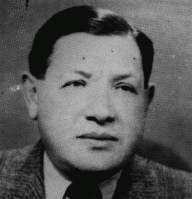
-
Dora Unger
ID CardDora, her parents, brother, aunt, uncle, and two cousins lived together in her grandfather's home in Essen, Germany. The Ungers were an observant Jewish family, and when Dora was 8, she began to regularly attend meetings of Brit HaNoar, a religious youth organization. 1933-39: In October 1938 a teacher, with tears in her eyes, came to Dora at the municipal pool, saying "Jews cannot swim here anymore." Just weeks later, on November 9, Jews were arrested and their property destroyed. A neighbor tried to…
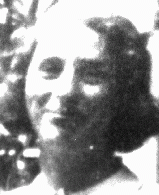
-
Jeno Nemeth
ID CardJeno moved to Szentes from a tiny farming community near the city of Szolnok, where he and his two brothers had been born to Jewish parents. Jeno owned a store that carried groceries and hardware items. He lived in the southeast Hungarian town of Szentes. Jeno and his wife, Juliana, had two married daughters, Barbara and Margit. Their son, Desider, was a dentist in Szentes. 1933-39: Jeno and his wife work hard in their store. The Depression of the 1930s was devastating, but things are starting to get a…
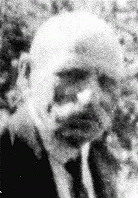
-
Collaboration
ArticleTo perpetrate the Holocaust, Nazi Germany relied on the help of allies and collaborators from across Europe, including governments, institutions, and individuals.
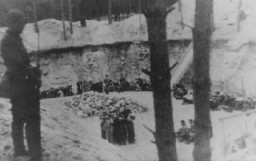
-
Hidden Children: Hardships
ArticleParents, children, and rescuers faced daunting challenges once the decision was made for a child to go into hiding during the Holocaust.
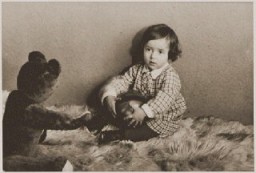
-
Klaus Barbie: The Butcher of Lyon
ArticleKlaus Barbie, chief of the Gestapo in Lyon, France, was nicknamed the "Butcher of Lyon" for his brutal actions towards Jews and members of the French Resistance.
-
Auschwitz Through the Lens of the SS: Frankfurt Trial
ArticleKarl Höcker’s album shows him in close contact to the main perpetrators at Auschwitz-Birkenau. Learn about his 1963 trial and the significance of his album.
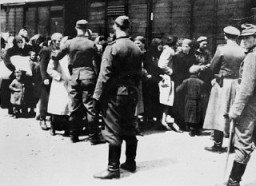
-
Lea Ofner-Szemere
ID CardLea was born in the city of Sombor in northeastern Yugoslavia. When she was 3 years old, her parents divorced and she moved to Vienna with her mother, who taught English and French to Austrian children. Lea enjoyed living in Vienna as a child. 1933-39: Lea returned to Sombor almost every year to visit her mother's relatives. There, she became reacquainted with her younger half-sister, Julia, and her older half-brother, Francis, and would miss them when she returned to Vienna. In 1938, the Germans annexed…
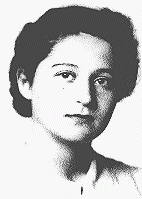
-
Israel Yitzak Kisielnicki
ID CardThe youngest of three children, Israel Yitzak was born to Jewish parents living 35 miles east of Warsaw in the small, predominantly Jewish town of Kaluszyn. Israel's mother was a housewife, and his father was a merchant who often traveled on business, by horse and wagon, to Warsaw. Israel attended public school and also received religious instruction. 1933-39: When Germany invaded Poland several days ago, many kids Israel's age, afraid of what would happen if the Germans occupied Poland, fled to the USSR,…
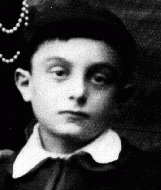
-
Lackenbach (Roma internment and transit camp)
ArticleThe Lackenbach internment and transit camp for Roma, located in what had been eastern Austria, was a departure point for deportations to Lodz and Auschwitz.
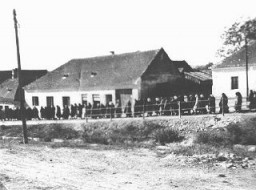
-
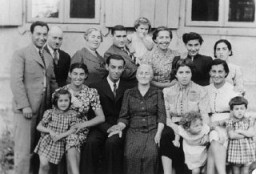
-
Terez Goldberger Kalman
ID CardTerez came from a religious Jewish family. She and her husband, Samuel, raised eight children in Satoraljaujhely, in northeastern Hungary. The Kalmans lived on the outskirts of the city, and in the 1920s they ran a canteen for the soldiers who lived in the nearby barracks. The Kalmans were proud Hungarians; one of their sons had died in World War I. 1933-39: Since Samuel died a few years ago, Terez has been alone here in her house in Satoraljaujhely. Many of her children live nearby, though, so her home…
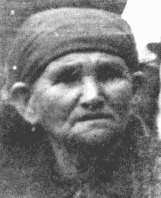
-
Buchenwald
ArticleThe Nazi regime established the Buchenwald camp in 1937. Learn about the camp’s prisoners, conditions there, forced labor, subcamps, medical experiments, and liberation.
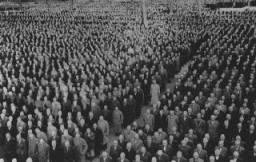
-
David Morgensztern
ID CardThe second of four children, David, or Duvid as he was called by his family, was born to Jewish parents living 35 miles east of Warsaw in the small predominantly Jewish town of Kaluszyn. David's mother and grandmother ran a newspaper kiosk in town, and his father worked as a clerk in the town hall. David attended public elementary school. 1933-39: War has broken out between Poland and Germany. Many people are afraid of what might happen if the Germans occupy Poland and have decided to flee to the Soviet…
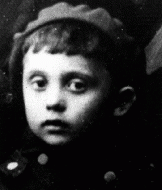
-
Jakab Katz
ID CardJakab, a religious Jew, was the father of eight children. In the early 1900s he sailed to America, paying his way by shoveling coal on the ship. In New York he earned enough money to help two of his daughters immigrate. Returning to Buj, he eventually moved his family to Zalkod, a small town in northeastern Hungary. There, helped by his wife, Terez, and his son, Miklos, he ran a store and a farm. 1933-39: Jakab's daughter, Sadie, and her two children, Lillian and Arthur, are visiting from America. The…
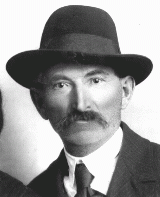
-
Wilek (William) Loew describes forced labor in Lvov
Oral HistoryWilek was the son of Jewish parents living in the southeastern Polish town of Lvov. His family owned and operated a winery that had been in family hands since 1870. Wilek's father died of a heart attack in 1929. Wilek entered secondary school in 1939. Soon after he began school, World War II began with the German invasion of Poland. Lvov was in the part of eastern Poland annexed by the Soviet Union. Although the Soviets took over Wilek's home and the family business, Wilek was able to continue his…
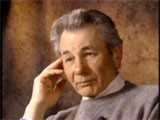
-
Hajj Amin al-Husayni: Arab Nationalist and Muslim Leader
ArticleHajj Amin al-Husayni claimed to speak for the Arab nation and the Muslim world and sought an alliance with the Axis powers during WWII. Learn more about his actions
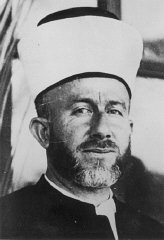
-
Hodonín U Kunštátu (Hodonín bei Kunstadt) (Roma camp)
ArticleIn March 1942, the Hodonin camp was classified as a camp for Roma. It was a transfer station during deportation to Auschwitz-Birkenau. Learn about the camp and its history.
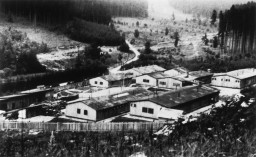
-
Eleanor Roosevelt
ArticleEleanor Roosevelt, longest serving First Lady in US history, used her social and political influence to intervene on behalf of refugees before and during WWII.
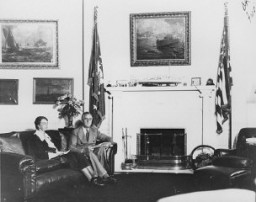
-
Forced Labor: In Depth
ArticleForced labor, often pointless, humiliating, without proper equipment, clothing, nourishment, or rest, was a core feature in the Nazi camp system from its beginnings in 1933.
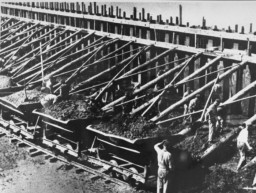
-
Elie Wiesel
ArticleElie Wiesel was a human rights activist, author, and teacher who reflected on his experience during the Holocaust in more than 40 books. Learn more.
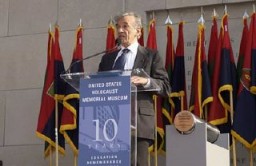
-
Life After the Holocaust: Thomas Buergenthal
ArticleAfter WWII and the fall of the Nazi regime, Holocaust survivors faced the daunting task of rebuilding their lives. Listen to Thomas Buergenthal's story.
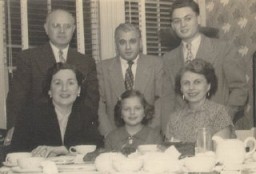
-
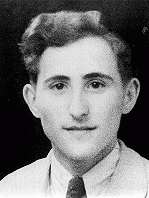
-
Concentration Camp System: In Depth
ArticleThe Nazi regime's extensive camp system included concentration camps, forced-labor camps, prisoner-of-war camps, transit camps, and killing centers.
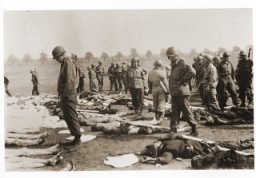
-
Henny Fletcher Aronsen describes liberation from a death march from Stutthof
Oral HistoryHenny was born into an upper-middle-class Jewish family in Kovno, Lithuania. She and her brother attended private schools. In June 1940 the Soviets occupied Lithuania, but little seemed to change until the German invasion in June 1941. The Germans sealed off a ghetto in Kovno in August 1941. Henny and her family were forced to move into the ghetto. Henny married in the ghetto in November 1943; her dowry was a pound of sugar. She survived several roundups during which some of her friends and family were…
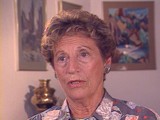
-
The United States and the Refugee Crisis, 1938–41
ArticleNazi Germany’s territorial expansion and the radicalization of Nazi anti-Jewish policies triggered a mass exodus. Learn about the US and the refugee crisis of 1938–41.
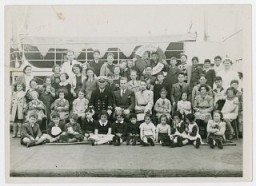
-
How did the Nazis and their collaborators implement the Holocaust?
Discussion QuestionWhen Nazi Party leader Adolf Hitler became German chancellor on January 30, 1933, no step-by-step blueprint for the genocide of Jews as a “race” existed. After the outbreak of World War II, millions of Jews came und...
